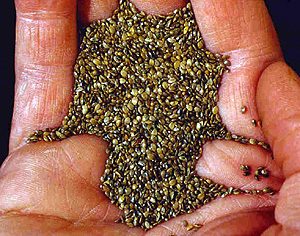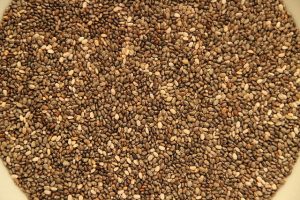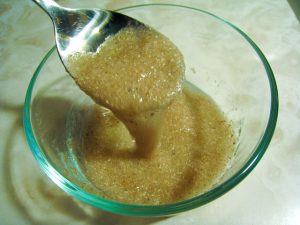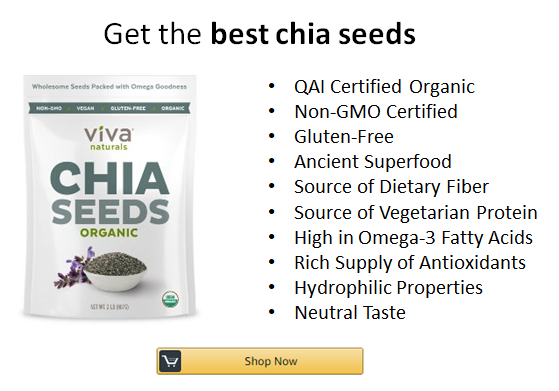Like the Chia seed, Chia oil is itself rich in valuable vital substances: In addition to vitamins and minerals, Chia oil with the highest omega-3 fatty acid content, which can be obtained from vegetable raw materials, is also rich in vitamins and minerals. Chia oil thus qualifies itself as a valuable nutritional supplement: regularly taken, it strengthens the immune system, has a positive effect on the entire metabolism and blood pressure, protects the cells, ensures good nerves, good mood and mental resilience.
Contents
- 1 How is Chia oil extracted?
- 2 The ingredients of Chia Oil
- 3 The omega-3 fatty acids alpha-linolenic acid and linoleic acid
- 4 Polysaccharid
- 5 Antioxidantien
- 6 Minerals and trace elements
- 7 Studies on chia oil and its primary ingredients
- 8 Omega-3 fatty acids reduce cardiovascular and dementia risks
- 9 Ingestion and use of Chia oil
- 10 Chia Oil – A Result
How is Chia oil extracted?
 Nearly 40% oil is contained in the Chia seeds, the seeds of the sage plant “Salvia hispanica”, which is mainly found in Mexico. The seeds of the sage were already used in pre-Spanish times as a kind of “superfood”, for example as energy-rich staple food for travellers.
Nearly 40% oil is contained in the Chia seeds, the seeds of the sage plant “Salvia hispanica”, which is mainly found in Mexico. The seeds of the sage were already used in pre-Spanish times as a kind of “superfood”, for example as energy-rich staple food for travellers.
For the extraction of the oil in organic quality, a purely physical extraction process is carried out: only compressed CO2 is used under high pressure and dissolves the valuable ingredients from the Chia seeds. When the pressure drops, the extracts are released again – in this case as oil. Since neither heat nor chemicals are used, there is no need for any kind of stress on the end product.
Chia oil is almost tasteless, clear and colorless. Only a slight “nutty” fragrance is noticeable for sensitive noses.
The ingredients of Chia Oil
Chia oil contains the following valuable ingredients:
✚ 60 % alpha-linolenic acid
✚ up to 26% linoleic acid
✚ few saturated fatty acids such as palmitic acid
✚ About 20% proteins – consisting of all eight essential amino acids
✚ Vitamins, minerals and trace elements
✚ Polysaccharid
The omega-3 fatty acids alpha-linolenic acid and linoleic acid
Chia oil is still relatively unknown in Germany – for example, it supplies vegans and vegetarians with the omega-3 fatty acids that are so important. The proportion of omega-3 fatty acids corresponds with about 60% to that of linseed oil: Because these substances have anti-inflammatory and blood-diluting effects, they have a positive effect on the cardiovascular system, lower cholesterol levels and have anti-inflammatory and blood-diluting effects. Even the risk of arteriosclerosis and heart attack can be kept under control with their help.
Polysaccharid
Polysaccharides, also known as polysaccharides, are not only present in the Chia seed but also in the oil. They have the property of inhibiting and slowing down carbohydrate breakdown in the intestine. This ensures a delayed power supply. In addition, the intestinal activity is stimulated. Both properties help, for example, in a diet to prevent sudden energy loss with the following ravenous hunger attack.
Antioxidantien
Free radicals are completely natural “waste products” of all metabolic processes, but they also enter the organism via the air inhaled or through food. They attack the DNA and RNA of the cells, which may lead to defective replication, but they also damage important proteins, for example. A certain number of free radicals is completely normal – but if they become more prevalent, the body’s cells are permanently damaged and aging processes are set in motion.
So-called antioxidants are able to chemically occupy or decompose the free radicals and thus stop their harmful effects. In the body, they contribute to healing processes, cell protection and cell regeneration and prevent aging. As components in Chia seeds, for example, they make them almost indefinitely durable.
Minerals and trace elements
 Chia seeds and correspondingly also chia oil contain valuable minerals and trace elements such as calcium, phosphorus, magnesium, potassium, zinc or copper.
Chia seeds and correspondingly also chia oil contain valuable minerals and trace elements such as calcium, phosphorus, magnesium, potassium, zinc or copper.
Calcium is important for bone formation, magnesium supports muscle function and blood clotting.
Copper, together with manganese and iron, is indispensable for the formation of blood and thus indirectly for the oxygen supply of the entire organism via the bloodstream.
Copper, calcium and magnesium together are involved in important nerve and brain metabolism processes and are therefore important for mental performance and strong nerves. The electrolyte potassium is also important for nerve and muscle function and regulates the fluid balance of the cells.
Vitamin A
Vitamin A or retinol is known for its positive effect on the eyes, skin and mucous membranes. It is also involved in the formation of red blood cells and iron absorption as well as in all cell renewal processes. Vitamin A is essential for fertility and the immune system, as well as for a stable immune system.
Vitamin B1
Vitamin B1, also known as thiamine, is known for its calming and calming effect on the nerves. Even injured or irritated nerves that send pain signals to the brain can be “soothed” with vitamin B1. A well-filled vitamin B1 reservoir is vital – but the organism cannot produce it itself, and the supply via food or dietary supplements is therefore essential.
Vitamin B2
Vitamin B2 or riboflavin plays an important role in the enzyme and coenzyme balance: it is involved in the conversion of nutrients into usable energy. Its positive effect on migraine attacks is used by neurologists in a targeted manner.
Vitamin B3
Vitamin B3 is also known as niacin or nicotinic acid. Usually the consumption of meat or offal supplies the organism with this substance. Chia oil, however, is also an important vegetarian source. Without vitamin B3, the body is not able to produce enough fatty acids.
Vitamin B3 is involved in the metabolism of nutrients, cell regeneration and as an antioxidant, as well as in the production of neurotransmitters.
Studies on chia oil and its primary ingredients
Almost all study results for Chia seeds can also be transferred to the intake of Chia oil – only the active substance concentration is somewhat higher.
While the efficacy of fish oil capsules, for example, is repeatedly disputed in scientific publications, the long-term optimal supply of omega-3 fatty acids seems to have some important effects.
Omega-3 fatty acids reduce cardiovascular and dementia risks
In October 2013, for example, a group of US researchers demonstrated that the intake of sufficient omega-3 fatty acids could significantly reduce the risk of age dementia or the development of Alzheimer’s disease. The study referred to fish oil – but chia seeds and chia oil are the most important vegetable sources of the unsaturated fatty acids contained in fish oil.
Also worth mentioning is a study from 2005, which focuses on Chia seeds and their high content of alpha-linolenic acid, ALA for short. It has been documented that regular intake of cortisol levels and the risk of cardiovascular disease can actually be reduced and even the risk of cancer reduced.
Ingestion and use of Chia oil
 Since Chia oil is tasteless, it can be taken pure and pure – just one tablespoon a day ensures the supply of important vital substances and has a positive effect in the long term.
Since Chia oil is tasteless, it can be taken pure and pure – just one tablespoon a day ensures the supply of important vital substances and has a positive effect in the long term.
Another possibility is to use it in the kitchen, where it can replace rape or olive oil. It can be mixed not only in fresh juices (e. g. carrot juice), smoothies or muesli, but is also suitable for salad dressings.
While caution is often required with other oils, Chia Oil can also be used for frying or baking. However, some valuable vital substances are lost during heating.
Despite the presence of antioxidants, the linolenic acid contained in the oil decomposes after a certain period of time, resulting in a rancid, bitter taste. At the latest now opened bottles should be disposed of.
Chia Oil – A Result
Chia oil has a positive effect on all metabolic functions, is excellently suited for all areas of the kitchen as well as for all health-conscious or stomach-sensitive persons. Chia oil is also a vital source of nutrients for those who consistently eat vegan or vegetarian food. A diet can be effectively supported with Chia oil: The supply of essential amino acids is guaranteed and the oil guarantees an efficient digestion.



